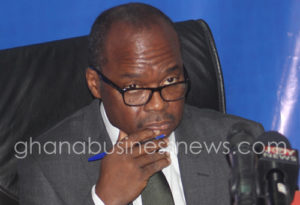Bank of Ghana raises policy rate to 30%

The Monetary Policy Committee of the Bank of Ghana on Monday increased the policy rate by 50 basis points to 30 per cent, citing risks to inflation.
Dr Ernest Addison, the Governor of the Central Bank said in the Committee’s assessment risks to the inflation profile remain elevated driven by the second round effects of food prices.
The Governor was speaking at a press briefing after the 113th Monetary Policy Committee (MPC) meetings held from Wednesday, July 19, 2023, to Friday, July 21, 2023.
The Committee deliberated on global macroeconomic and recent domestic macroeconomic developments including the implementation of the IMF-supported Extended Credit Facility programme for the first six months of 2023 and assessed risks to the inflation outlook.
He said that even though Central Bank’s financing had been eliminated in the first six months of the year, Ghana’s macroeconomic framework required decisive tightening from both the fiscal and monetary side to anchor inflation expectations firmly on the decline.
The Governor said given these considerations, and under the current circumstances, the Committee had decided to increase the Monetary policy rate by 0.5 per cent to 30 per cent.
He said the global headline inflation continued to ease in many countries although remaining elevated at historically high levels.
Dr Addison said the ease had been driven by the effects of tighter monetary policy, lower energy and food prices and impact of reduced supply bottlenecks.
The Governor said the core inflation had, however, proven somewhat more persistent amid cost pressures and resilient labour markets.
“Despite production cuts by some OPEC+ members, oil prices remain subdued amidst the uncertain global conditions, meanwhile, most survey-based indicators of longer-term inflation expectations remain anchored at around 2 percent for Advanced Economies,” she added.
On the domestic front, Dr Addison said headline inflation inched up for the second consecutive month on the back of strong food price pressures. However, relative exchange rate stability, stable ex-pump petroleum prices, and effective liquidity management by the Bank of Ghana were exerting a moderating influence on non-food prices.
He said the two price readings since the May MPC meeting saw headline inflation rising to 42.5 per cent in June 2023, from 42.2 per cent in May 2023.
The uptick was driven mainly by food inflation which went up to 54.2 per cent in June 2023 from 51.8 per cent in May, while non-food inflation declined to 33.4 per cent from 34.6 per cent over the same period.
He said in a similar direction, underlying inflationary pressures also picked up slightly for the second consecutive month since April 2023.
He said all the Bank’s core inflation measures rose in the last two months. Core inflation excluding energy and utility prices, increased to 43.5 per cent in June 2023, from 42.8 per cent in May 2023.
The Governor said business and consumer inflation expectations similarly inched up while inflation expectations from the financial sector remained flat.
He said in the year to May 2023, the Bank’s high-frequency real sector indicators all showed signs of recovery in economic activity, albeit at a slower pace.
He said banks’ half-year performance in 2023 also shows considerable profit growth, following significant losses posted in 2022 on account of the DDEP.
Dr Addison said if this trend continues, “we expect banks to rebuild capital buffers quickly in addition to equity capital injections by shareholders to give a further boost to real sector growth and to build resilience of the banking sector.”
“Early operationalisation of the Ghana Financial Stability Fund should also help provide additional recapitalisation support for eligible banks in line with the criteria and governance framework agreed with the IMF and the World Bank,” he added.
Source: GNA
